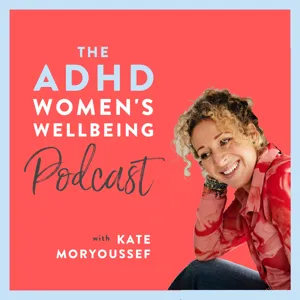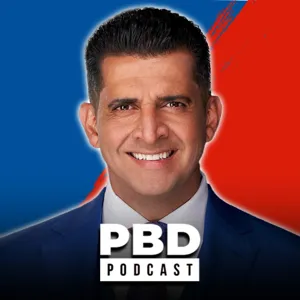Podcast Summary
Diet and lifestyle choices impact ADHD and anxiety: Working with nutrition and lifestyle experts can help minimize ADHD symptoms, improve overall health, and address medication side effects.
Diet and lifestyle choices can significantly impact the experience of ADHD and anxiety for both individuals and their families. Nutrition and lifestyle coaching, as offered by experts like Shauna Hughes, can empower individuals to take control of their well-being and optimize the effects of medication. Diet can help minimize ADHD symptoms, improve overall health, and address medication side effects. It's important for individuals to work closely with healthcare professionals to understand how food interacts with their specific medications and to make informed choices that best support their well-being.
Managing Side Effects of ADHD Medication: Maintain a balanced diet with palatable food options, especially during medication hours. Crunchy, salty snacks and nuts can help manage side effects like loss of appetite, and consistent eating routines can support healthy habits.
People with ADHD who choose to take medication often face side effects such as loss of appetite, which can lead to unhealthy eating habits and poor sleep quality. These issues can negatively impact their ADHD management. To help mitigate these side effects, it's essential to maintain a balanced diet with palatable food options, especially during medication hours. Crunchy, salty snacks may be more tolerable for some individuals, and incorporating nuts or trail mix can provide necessary protein for stable blood sugar levels. Establishing a consistent eating routine, including setting reminders and starting small, can also support healthy habits and improve overall well-being.
Maintain proper nutrition and hydration while on Adderall: Prioritize cold foods, create a healthy food environment, and continue healthy eating habits after coming off medication.
When taking medication like Adderall that increases brainpower and focus, it's essential to prioritize proper nutrition and hydration to maintain emotional regulation and overall well-being. Cold foods, such as frozen fruit, sandwiches, and veggies, can be more tolerable and easier to consume than hot foods. Creating a healthy and easily accessible food environment, including healthy snacks and hydrating beverages, can help establish new habits and prevent potential bingeing. For those coming off medication, maintaining a similar healthy eating routine can continue to support emotional and physical health throughout the day, especially during the evening hours.
Maintain stable energy levels with balanced meals: Balance meals with protein, healthy fats, and complex carbs to avoid energy crashes and mood swings after taking medication. Pair higher carb snacks with protein or fat sources to maintain stable energy levels.
To avoid the energy crash and mood swings after taking medication, it's essential to consume foods that provide a balance of nutrients, including protein, healthy fats, and complex carbs. Avoiding pure carb foods, such as chips, crackers, and bread, can help prevent the rapid spike and subsequent crash in blood sugar levels. Instead, pairing higher carb snacky foods with protein-rich or fatty options, like chocolate-covered nuts, hummus with vegetables, or tortilla chips with guacamole, can help maintain stable energy levels and improve overall well-being. Keeping easily prepared combinations, such as avocado, smoked salmon, cottage cheese, and rye crackers, can be a quick and convenient go-to for those seeking a balanced meal. Additionally, having a consistent meal plan with easily accessible, nutrient-dense foods can help reduce the stigma and shame surrounding medication use and improve overall quality of life for individuals and their families.
Empowering Healthy Choices with 'Stoplight Foods': Create a list of green, yellow, and red foods to make healthier alternatives accessible during cravings or hunger, using the 'stoplight foods' method.
Creating a list of "go-to" healthy foods, categorized as green, yellow, and red, can help empower individuals during moments of hunger or cravings, providing them with healthier alternatives instead of reaching for unhealthy snacks. This strategy, known as the "stoplight foods" method, can be used while grocery shopping and planning meals. Additionally, Kate encourages exploring her free resources on her website, including downloads for those suspecting ADHD, well-being toolkits, calming techniques, and workshops on using EFT for overwhelm and thriving with ADHD after diagnosis.
Diet for ADHD: Anti-inflammatory and Easily Digestible Foods: ADHD individuals benefit from anti-inflammatory, easily digestible diets rich in protein, including fish, meat, fruits, veggies, and nuts. Addressing digestive issues and promoting neurotransmitter production are crucial for managing symptoms and overall well-being.
Individuals with ADHD can benefit significantly from a diet rich in anti-inflammatory, easily digestible foods, particularly those high in protein. Foods like fish, good quality meat, fruits, vegetables, and nuts are ideal. The reason being that individuals with ADHD often experience more inflammation and require the raw materials for neurotransmitter production. Additionally, addressing digestive issues is crucial as poor digestion can impact brain function through the mind-gut connection. Overall, maintaining a healthy, anti-inflammatory diet is essential for managing ADHD symptoms and promoting overall well-being. Individuals with ADHD are more sensitive to various factors, and taking extra care of ourselves through proper nutrition is crucial to prevent potential issues.
ADHD and Nutrient Deficiencies: People with ADHD may have higher rates of certain nutrient deficiencies, such as iron, omegas, B vitamins, zinc, magnesium, and vitamin D, which can worsen symptoms. Consider supplementing with omega-3 fatty acids and vitamin D to improve symptoms and overall well-being, especially during winter or in areas with limited sunlight.
Individuals with ADHD often have various deficiencies, including iron, omegas, B vitamins, zinc, magnesium, and vitamin D. These deficiencies are more prevalent in the ADHD community and can worsen symptoms. Conditions like IBS, celiac disease, and autoimmune issues are also more common. The body and brain of individuals with ADHD are more reactive and sensitive to the environment. Deficiencies can impact mood, focus, sleep, and overall health. Omega-3 fatty acids and vitamin D are two essential nutrients that many people should consider supplementing, especially during winter months or in areas with limited sunlight. Vitamin D is challenging to obtain naturally, and omega-3 fatty acids are not commonly consumed in large quantities in North America. Supplementing with these nutrients can help improve symptoms and overall well-being.
Omega-3s and Magnesium for ADHD: Omega-3s, especially EPA, can enhance focus and concentration for people with ADHD. Vegans and vegetarians may need larger intakes of flaxseed oil, chia seeds, walnuts, or hemp to get the same benefits. Magnesium can also aid sleep and nervous system function, making it beneficial for those with ADHD, especially since many are deficient.
Omega-3 fatty acids, particularly EPA, are essential nutrients that can significantly improve focus and concentration for most people, making them a recommended supplement for individuals with ADHD. However, converting plant-based omegas into the usable form is inefficient, so vegans and vegetarians may need to consume large amounts of flaxseed oil, chia seeds, walnuts, or hemp to achieve the same benefits. Magnesium, another essential mineral, can also be beneficial for individuals with ADHD as it can help with sleep and nervous system function, especially given the prevalence of magnesium deficiencies due to depleted soil.
Proper Nutrition for Mental Health and ADHD: Maintain nutritional levels for mental health, focus on Niacin, Vitamin C, Magnesium, and B Vitamins for nervous system function, consider magnesium bisglycinate for deficiencies, and methylated B vitamins for methylation issues.
Maintaining proper nutritional levels is essential for mental health, especially for individuals with ADHD. Some vitamins and minerals, such as Niacin, Vitamin C, Magnesium, and B Vitamins, play crucial roles in nervous system function and can alleviate symptoms related to ADHD. However, it's important to be cautious when taking large doses, as they can lead to adverse effects like loose bowel movements or restless leg syndrome. Magnesium bisglycinate, a better form of magnesium, is recommended for addressing magnesium deficiencies, which can impact sleep quality and cause restless leg syndrome. L-Theanine, an amino acid found in green tea, has gained popularity for its calming effects and potential benefits for individuals with ADHD. B Vitamins, particularly methylated forms like Methyltetrahydrofolate or methylated folate, are essential for nervous system function and can help address deficiencies. Additionally, poor methylation, a common genetic mutation, can hinder the body's ability to process B vitamins effectively. By focusing on methylated forms of these vitamins, individuals can better support their mental health and alleviate symptoms associated with ADHD.
B vitamins help reduce anxiety and promote calm mood: Take B vitamins in the morning, consider fish oil for brain health, probiotics support gut health linked to brain function, a multi-supplement regimen ensures adequate nutrient intake
B vitamins, particularly B2 and B6, can help reduce anxiety and promote a calm mood due to their role in the production of neurotransmitters. These vitamins are water-soluble and safe to take in high doses, as they are excreted from the body through urine. It's recommended to take B vitamins in the morning because they are quickly used up by the body and can be taken with food to enhance absorption. Omega-3 fatty acids, found in fish oil supplements, do not have a specific recommended time to take them, but they are often combined with vitamin D, which should be taken with a meal containing fat for optimal absorption. Probiotics are also recommended for maintaining good mental health as they support gut health, which is linked to brain function. A multi-vitamin, fish oil, and probiotic supplement regimen is a simple and effective way to ensure adequate nutrient intake for overall wellness.
The Importance of Probiotics for Gut Health: Probiotics are essential bacteria for gut health, but many consume too many sugary foods, leading to harmful bacteria growth. High-quality probiotic supplements with multiple strains and large CFUs can improve digestion and alleviate constipation, while also potentially reducing anxiety symptoms.
Probiotics are essential healthy bacteria that support a healthy gut. However, many people don't consume enough probiotic-rich foods and instead consume sugary, carbohydrate-heavy foods that feed harmful bacteria, leading to an imbalance. Probiotics are important for regularity and can help alleviate constipation. When looking for probiotics, it's important to choose high-quality supplements with a large number of colony-forming units (CFUs) and multiple strains of bacteria. A good probiotic can make a significant impact on digestion for many people, but it can be pricey. Despite the cost, probiotics can provide a foundation for overall well-being and can help improve symptoms of anxiety, among other conditions. It's important for individuals to consider adding probiotics to their supplement routine as part of a holistic approach to health.
Ignoring Digestive Issues Can Lead to Surprises: Many people overlook digestive symptoms like bloating and constipation, but addressing these issues can lead to significant improvements in gut health. Small changes can make a big difference, and seeking professional help or resources is a valuable investment in overall wellbeing.
Many people may be experiencing digestive issues without realizing it. These issues can include bloating, constipation, and other symptoms that may not be immediately recognized as digestive problems. Sometimes, once these issues are addressed, individuals may realize they have been experiencing symptoms for an extended period without awareness. It's essential to investigate further and consider making dietary changes or trying supplements to improve gut health. Shauna Hughes, a nutritionist, emphasizes that this doesn't mean individuals need to overhaul their entire lifestyle or spend a lot of money. Instead, small changes can make a significant difference. Hughes is most active on Instagram as @shawnahughesnutrition and can be contacted through her website, shawnahughesnutrition.com, for those interested in working with her. Remember, knowledge and awareness are powerful tools, especially for individuals with ADHD. Share this episode with others who may benefit, and consider leaving a review to help spread the word.






